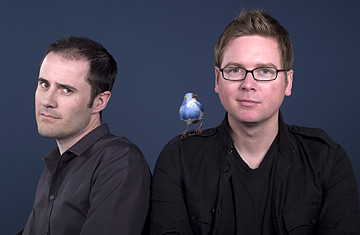
Evan Williams and Biz Stone of Twitter
(5 of 8)
One of the most telling facts about the Twitter platform is that the vast majority of its users interact with the service via software created by third parties. There are dozens of iPhone and BlackBerry applications--all created by enterprising amateur coders or small start-ups--that let you manage Twitter feeds. There are services that help you upload photos and link to them from your tweets, and programs that map other Twitizens who are near you geographically. Ironically, the tools you're offered if you visit Twitter.com have changed very little in the past two years. But there's an entire Home Depot of Twitter tools available everywhere else.
As the tools have multiplied, we're discovering extraordinary new things to do with them. Last month an anticommunist uprising in Moldova was organized via Twitter. Twitter has become so widely used among political activists in China that the government recently blocked access to it, in an attempt to censor discussion of the 20th anniversary of the Tiananmen Square massacre. A service called SickCity scans the Twitter feeds from multiple urban areas, tracking references to flu and fever. Celebrity Twitterers like Kutcher have directed their vast followings toward charitable causes (in Kutcher's case, the Malaria No More organization).
Social networks are notoriously vulnerable to the fickle tastes of teens and 20-somethings (remember Friendster?), so it's entirely possible that three or four years from now, we'll have moved on to some Twitter successor. But the key elements of the Twitter platform--the follower structure, link-sharing, real-time searching--will persevere regardless of Twitter's fortunes, just as Web conventions like links, posts and feeds have endured over the past decade. In fact, every major channel of information will be Twitterfied in one way or another in the coming years:
NEWS AND OPINION. Increasingly, the stories that come across our radar--news about a plane crash, a feisty Op-Ed, a gossip item--will arrive via the passed links of the people we follow. Instead of being built by some kind of artificially intelligent software algorithm, a customized newspaper will be compiled from all the articles being read that morning by your social network. This will lead to more news diversity and polarization at the same time: your networked front page will be more eclectic than any traditional-newspaper front page, but political partisans looking to enhance their own private echo chamber will be able to tune out opposing viewpoints more easily.
SEARCHING. As the archive of links shared by Twitter users grows, the value of searching for information via your extended social network will start to rival Google's approach to the search. If you're looking for information on Benjamin Franklin, an essay shared by one of your favorite historians might well be more valuable than the top result on Google; if you're looking for advice on sibling rivalry, an article recommended by a friend of a friend might well be the best place to start.
